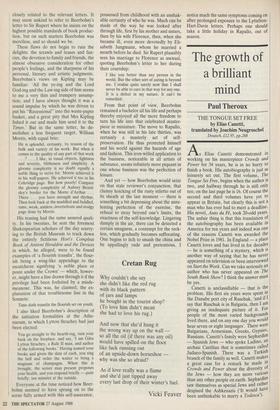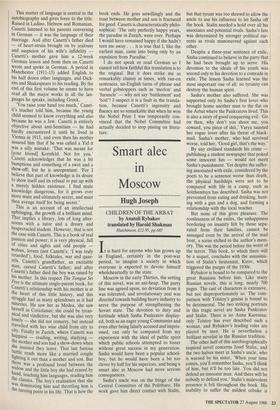The growth of a brilliant mind
Paul Theroux
THE TONGUE SET FREE by Elias Canetti, translated by Joachim Neugroschel
Deutsch, £12.95, pp.268
As Elias Canetti demonstrated in working on his masterpiece Crowds and Power for 34 years, he is in no hurry to finish a book. His autobiography is just as leisurely set out. The first volume, The Tongue Set Free, begins when the author is two, and halfway through he is still only ten; on the last page he is 16. Of course the second and third volumes have yet to appear in Britain, but clearly this is not a man who has ever had to meet a deadline. His novel, Auto da Fe, took 20-odd years. The unfair thing is that this translation of the autobiography has been available in America for ten years and indeed was one of the reasons Canetti was awarded the Nobel Prize in 1981. In England — a place Canetti loves and has lived in for decades — he is something of a mystery, which is another way of saying that he has never appeared on television or been interviewed on Start the Week. Can we take seriously an author who has never appeared on The South Bank Show? I think the answer must be yes.
Canetti is unclassifiable — that is the problem. His first six years were spent in the Danube port city of Ruschuk, 'and if I say that Ruschuk is in Bulgaria, then I am giving an inadequate picture of it. For people of the most varied backgrounds lived there, and on any one day you would hear seven or eight languages'. There were Bulgarians, Armenians, Greeks, Gypsies, Russians. Canetti's family were Sephardim _ Spanish Jews — who spoke Ladino, an archaic Castilian that is sometimes called Judaeo-Spanish. There was a Turkish branch of the family as well. Canetti makes a great case for a remark he made in Crowds and Power about the diversity of the Jews — how they are more various than any other people on earth. Sephardim saw themselves as special Jews and rather despised the Ashkenazis ('It would have been unthinkable to marry a Todesca')• This matter of language is central to the autobiography and gives force to the title. Raised in Ladino, Hebrew and Romanian, Canetti listened to his parents conversing in German — it was the language of their marriage. And after Canetti's father died — of heart-strain brought on by jealousy and suspicion of his wife's infidelity — Canetti's mother gave him a 12-week German lesson and from then on Canetti wrote and spoke in German. A period in Manchester (1911-13) added English to his half dozen other languages. and Dick- ens and Shakespeare to his reading. By the end of this first volume he seems to have read all the major works in all the lan- guages he speaks, including Greek.
'You raise your hand too much,' Canet- ti's teacher told him, because the young child seemed to know everything and also because he was a Jew. Canetti is entirely objective about anti-Semitism — he had hardly encountered it until he lived in Vienna in 1913, and even then his mother assured him that if he was called a Yid it was a silly mistake: 'That was meant for [your friend] Kornfeld. Not for you.' Canetti acknowledges that he was a bit bumptious and something of a swot and a show-off; but he is unrepentant: 'For I believe that part of knowledge is its desire to show itself and its refusal to put up with a merely hidden existence. I find mute knowledge dangerous, for it grows ever more mute and ultimately secret, and must then avenge itself for being secret.' This is an account of an intellectual Upbringing, the growth of a brilliant mind. That implies a library, lots of long after- noons with a tutor and a dreary and bespectacled student. However, that is not the case with Canetti. This is a book of real passion and power; it is very physical, full of cities and sights and odd people — wolves, lovers (not Canetti's: `I was truly retarded'), food, folktales, war and quar- rels. Canetti's grandfather, an excitable man, cursed Canetti's father; and after Canetti's father died the boy was raised by his mother. In this respect The Tongue Set Free is the ultimate single-parent book, for Canetti's relationship with his mother is at the heart of this little history, and this struggle had as many splendours as it had miseries. He saw her as Medea, she saw herself as Coriolanus; she could be tyran- nical and vindictive, but she was also very lonely — she did not remarry, but instead travelled with her wise child from city to City. Finally in Zurich, where Canetti was happiest — reading, writing, studying — the mother and son had a show-down when she insisted they leave. That last furious battle reads more like a married couple fighting it out than a mother and son. But there was a profound bond between the Widow and the little boy she had reared by hand, teaching him languages, reading him the classics. The boy's realisation that she was dominating him and throttling him is the turning point in his life. That is how the book ends. He goes unwillingly and the trust between mother and son is fractured for good. Canetti is characteristically philo- sophical: 'The only perfectly happy years, the paradise in Zurich, were over. Perhaps I would have remained happy if she hadn't torn me away . . . it is true that I, like the earliest man, came into being only by an expulsion from Paradise.'
I do not speak or read German so I cannot tell how faithful this translation is to the original. But it does strike me as remarkably clumsy at times, with run-on sentences, un-English turns of phrase and verbal gobstoppers such as 'merlon' and `furuncle' — why not say 'battlement' and 'boil'? I suspect it is a fault in the transla- tion, because Canetti's ingenuity and fluency are so remarkable that when he won the Nobel Prize I was temporarily con- vinced that the Nobel Committee had actually decided to stop pissing on litera- ture.















































 Previous page
Previous page